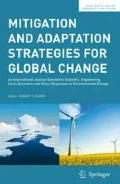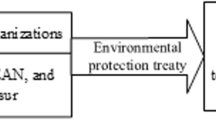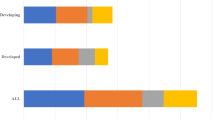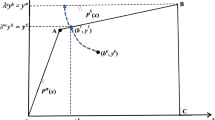Abstract
The world is moving toward efforts to reduce net greenhouse gas emissions. Reduction efforts may involve the agricultural sector through options such as planting of trees, altering crop and livestock management, and increasing production of biofuels. However, such options can be competitive with domestic food production. In a free trade arena, reduced domestic food production could stimulate increased production and exports in other countries, which are not pursuing net emission reductions. As a consequence, emission reduction efforts in implementing countries may be offset by production increases stimulated in other countries.
We examine the competitive effects of agriculturally related emission reduction actions on agricultural production and international trade. In doing this, we employ the assumption that U.S. emission reduction caused cost increases will also occur in other reducing countries. We consider emission reduction: 1) unilaterally by the U.S., 2) by all Kyoto Protocol Annex B countries, and 3) globally. The results, which are only suggestive of the types of effects that would be observed due to the simplifying cost assumptions, indicate compliance causes supply cutbacks in regulated countries and increases in non-regulated countries. The study results show that producers in regulating countries are likely to benefit and consumers lose due to commodity price increases.
Similar content being viewed by others
References
Alig, R.J., Adams, D.M., Callaway, J.M., Winnett, S.M. and McCarl, B.A.: 1997, ‘Assessing effects of mitigation strategies for global climate change with an intertemporal model of the U.S. forest and agriculture sectors’, Environmental and Resource Economics 9, 259–274.
Antle, J.M., Capalbo, S.M., Johnson, J.B. and Miljkovic. D.: 1999.‘The Kyoto Protocol: Economic effects of energy prices on northern plains dryland grain production’, Agricultural and Resource Economics Review 28(1), 96–105.
Antle, J.M., Capalbo, S.M., Mooney, S., Elliott, E.T. and Paustian. K.H.: 2002, ‘A comparative examination of the efficiency of sequestering carbon in U.S. agricultural soils’, American Journal of Alternative Agriculture 17(3), 109–115.
Babiker, M.H.: 2001, ‘Subglobal climate-change actions and carbon leakage: The implications of international capital flows’, Energy Economics 23, 121–139.
Babiker, M.H., Jacoby, H.D., Reilly J.M. and Reiner, D.M.: ‘The evolution of a climate regime: Kyoto to Marrakech’, Environmental Science and Policy 5(3), 192–206.
Barker, T.: 1999, ‘Achieving a 10 percent cut in Europe's carbon dioxide emissions using additional excise duties: Coordinated, uncoordinated and unilateral action using the econometric model E3ME’, Economic Systems Research 11(4), 401–421.
Bernstein, P., Montgomery, W.D. and Rutherford, T.F.: 1999, ‘Global impacts of the Kyoto agreement: Results from the MS-MRT model’, Resource and Energy Economics 21, 375–413.
Brooks, H.G., Aradhyula, S.V. and Johnson, S.R.: 1992, ‘Land quality and producer participation in U.S. commodity programs’, Review of Agricultural Economics 14(1), 105–115.
Chang, C.C., McCarl, B.A., Mjelde, J.W. and Richardson, J.W.: 1992, ‘Sectoral implications of farm program modifications’, American Journal Agricultural Economics 74, 38–49.
Chen, C.C.: 1999, Development and Application of a Linked Global Trade-Detailed U.S. Agricultural Sector Analysis System, Ph.D dissertation, Texas A& M University.
Chen, C.C. and McCarl, B.A.:2000, ‘The value of ENSO information to agriculture: Consideration of event strength and trade’, Journal of Agriculture and Resource Economics 25(2), 368–385.
Chomitz, K.M.: 2002, ‘Baseline, leakage and measurement issues: How do forestry and energy projects compare? Climate Policy 2(1), 35–49.
Felder, S. and Rutherford, T.: 1993, ‘Unilateral CO2 reductions and carbon leakage: The consequences of international trade in oil and basic materials’, Journal of Environmental Economics and Management 25, 162–176.
Fellin, L. and Fuller, S.: 1998, ‘Effects of privatizating Mexico's railroad system on U.S.–Mexico overland grain/oilseed trade’, Transportation Research Forum 37, 46–64.
Fellin, L. and Fuller, S.: 1997, ‘Effects of proposed waterway user change on U.S. grain patterns and producers’, Transportation Research Forum 36, 11–25.
Francl, T.: 1997, Potential Economic Impact of the Global Climate Treaty on the Agricultural Sector, Park Ridge, IL, American Farm Bureau Federation.
Francl, T., Nadler, R. and Bast, J.: 1998, The Kyoto Protocol and U.S. Agriculture, The Heartland Institute, No. 87, http://www.heartland.org/studies/gwag-sum.htm.
Hoag, D.L., Babcock, B.A. and Foster, W.E.: 1993, ‘Field-level measurement of land productivity and program slippage’, American Journal of Agricultural Economics 181–189.
IPCC: 1996, Climate Change 1995: The Science of Climate Change, Cambridge, Cambridge University Press.
IPCC: 2001a, Climate Change 2001: The Scientific Basis, Cambridge, Cambridge University Press.
IPCC: 2001b, Climate Change 2001: Impacts, Adaptation and Vulnerability, Cambridge, Cambridge University Press.
Jaffe, A.B., Peterson, S.R., Portney, P.R. and Stavins, R.N.: 1995, ‘Environmental regulation and the competitiveness of U.S. manufacturing: What does the evidence tell us?’, Journal of Economic Literature XXXIII, 132–163.
Konyar, K. and Howitt, R.E.: 2000, ‘The cost of the Kyoto Protocol to U.S. crop production: Measuring crop price, a regional acreage and input substitution effects’, Journal of Agricultural and Resource Economics 25, 347–3367.
McCarl, B.A., Chang, C.C., Atwood, J.D. and Nayda, W.I.: 2001, Documentation of ASM: The U.S. Agricultural Sector Model, Texas A & M University, http://ageco.tamu.edu/faculty/ mccarl/asm.html.
McCarl, B.A., Gowen, M., Schneider, U.A. and Yeats, T.: 1997, The Impact of Carbon Permit Prices on the U.S. Agricultural Sector, Prepared for Climate Policies and Programs Division, U.S. EPA, http://ageco.tamu.edu/faculty/mccarl/papers/759.pdf.
McCarl, B.A. and Schneider, U.: 2000, ‘Agriculture's role in a greenhouse gas emission mitigation world: An economic perspective’, Review of Agricultural Economics 22(1), 134–159.
McCarl, B.A. and Schneider, U.A.: 2001, ‘Greenhouse gas mitigation in U.S. agriculture and forestry’, Science 294 (21), 2481–2482.
Murray, B.C., McCarl, B.A. and Lee, H.C.: 2002, ‘Estimating Leakage from Forest Carbon Sequestration Programs’, Presented at 2002 World Congress of Environmental and Resource Economists, Monterey, California.
Oliveira-Martins, J., Burniaux, J.M. and Martin, J.P.: 1992, ‘Trade and the Effectiveness of Unilateral CO2-Abatement Policies: Evidence from GREEN’, OECD Economic Studies No. 19.
Peters, M., House, R., Lewandrowski, J. and McDowell, H.: 2001, ‘Economic Impacts of Carbon Charges on U.S. Agriculture’, Climatic Change 50(4), 445–473.
Pethig, R.: 1976, ‘Pollution, welfare and environmental policy in the theory of comparative advantage’, Journal of Environmental Economics and Management 2, 160–169.
Roningen, V.O., Sullivan, J. and Dixit, P.: 1991, ‘Documentation of the Static World Policy Simulation (SWOPSIM) Modeling Framework, Washington, DC, Economic Research Service, USDA Staff Report AGES 9151.
Samuelson, P.: 1952, ‘Spatial Price Equilibrium and Linear Programming’, American Economic Review 42, 283–303.
Schneider, U.: 2000, Agricultural Sector Analysis on Greenhouse Gas Emission Mitigation in the United States, Ph.D dissertation, Texas A&M University.
Schneider, U.A. and McCarl, B.A.: 2000, ‘Economic Potential of Biomass for Greenhouse Gas Emission Reductions: Comparative role in Agriculture’, Proceedings of conference on Sustainable Energy: New Challenges for Agriculture and Implications for Land Use, Wageningen University, The Netherlands.
Smith, C.: 1998, ‘Carbon leakage: An empirical assessment using a global econometric model’, in Terry Barker and Jonathan Kohler (eds.), International Competitiveness and Environmental Policies, Massachusetts, Edward Elgar Publishing, Inc., pp. 143–169.
Sparks Companies, Inc.: 1999, United Nations Kyoto Protocol: Potential Impacts on U.S. Agriculture. McLean. VA.
Takayama, T. and Judge, G.G.: 1971, Spatial and Temporal Price and Allocation Models, North-Holland Publishing Company.
United Nations, Framework Convention on Climate Change: 1998, Kyoto Protocol, Climate Change Secretariat (UNFCCC). [Online]. Available at http://www.unfccc.de/resource/convkp. html.
United States Department of Agriculture: 1950–1996, Agricultural Statistics: Various Issues, Washington DC. (http://www.usda.gov/nass/pubs/agstats.htm), annual.
United States Department of Agriculture, Office of the Chief Economist: 1999, Economic Analysis of U.S. Agriculture and the Kyoto Protocol, http://www.usda.gov/oce/gcpo/Kyoto.pdf.
United States Department of Agriculture: 1994a, Foreign Agricultural Trade of the United States, Washington DC., http://usda.mannlib.cornell.edu/reports/erssor/trade/fau-bb/.
United States Department of Agriculture: 1994b, Grain: World Market and Trade, Washington DC.
United States Department of Agriculture: 1994c, Oilseed: World Market and Trade, Washington DC.
United States Global Change Research Program, National Assessment Synthesis Team: 2000, Climate Change Impacts on the United States –Overview Report: The Potential Consequences of Climate Variability and Change, New York, Cambridge University Press.
Wu, J.: 2000, ‘Slippage effects of the conservation reserve programs’, American Journal of Agricultural Economics 82, 979–992.
Wu, J., Zilberman, D. and Babcock, B.A.: 2001, ‘Environmental and distributional effects of conservation targeting strategies’, Journal of Environmental Economics and Management 41, 333–350.
Author information
Authors and Affiliations
Corresponding author
Additional information
Seniority of Authorship is shared among the first three authors.
Rights and permissions
About this article
Cite this article
Lee, HC., McCarl, B.A., Schneider, U.A. et al. Leakage and Comparative Advantage Implications of Agricultural Participation in Greenhouse Gas Emission Mitigation. Mitig Adapt Strat Glob Change 12, 471–494 (2007). https://doi.org/10.1007/s11027-006-2941-y
Received:
Accepted:
Published:
Issue Date:
DOI: https://doi.org/10.1007/s11027-006-2941-y




